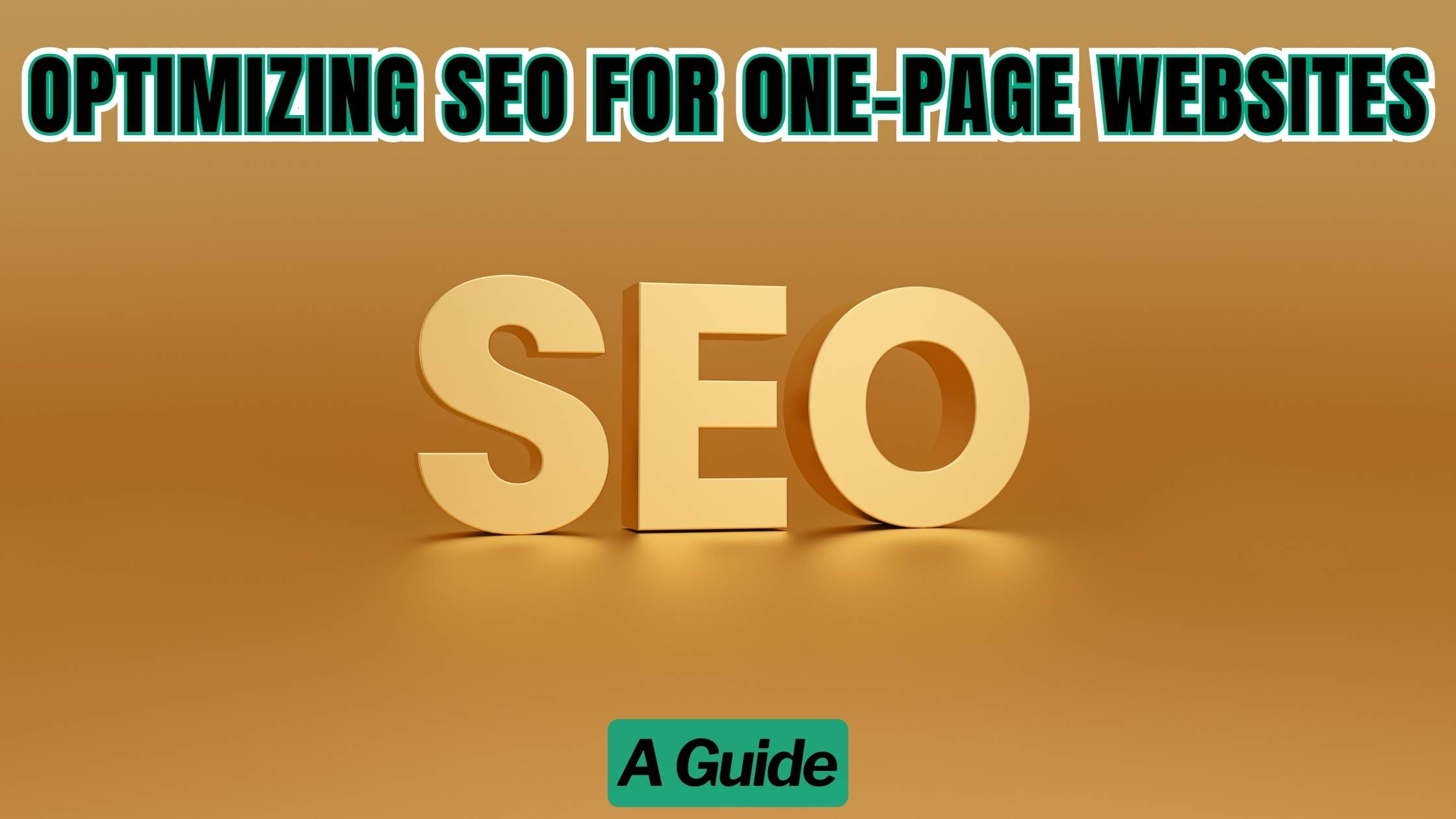Optimizing SEO for one-page websites: Guide
-


Optimizing SEO for One-Page Websites: A Comprehensive Guide
In today’s digital landscape, one-page websites have gained popularity due to their simplicity, ease of navigation, and ability to convey information concisely. However, optimizing these single-page sites for search engines presents unique challenges. In this guide, we’ll delve into the intricacies of SEO optimization for one-page websites, providing actionable strategies and best practices to enhance visibility, drive traffic, and improve rankings.
Understanding the Challenges of One-Page Website SEO
1. Limited Content:
One of the primary challenges of optimizing SEO for one-page websites is the limited amount of content available. With all information condensed onto a single page, it can be challenging to target a wide range of keywords and provide comprehensive details about products or services.
2. Lack of Internal Linking:
Internal linking plays a crucial role in SEO by helping search engines understand the structure and hierarchy of a website. However, one-page websites typically lack internal linking opportunities, making it difficult to distribute link equity and establish topical relevance across multiple pages.
3. Page Load Speed:
Page load speed is a critical ranking factor for search engines, and one-page websites, if not optimized properly, may suffer from slow loading times due to large file sizes or excessive use of multimedia content. Slow-loading pages can negatively impact user experience and search engine rankings.
4. Limited Keyword Targeting:
With only one page to target keywords, one-page websites must prioritize keyword selection carefully to ensure alignment with user intent and search queries. Failing to optimize for the right keywords can result in poor visibility and missed opportunities to attract relevant traffic.
Strategies for Optimizing SEO on One-Page Websites
1. Conduct Comprehensive Keyword Research:
Begin by conducting thorough keyword research to identify relevant terms and phrases that align with your target audience’s search intent. Focus on long-tail keywords and semantic variations to capture a broader range of search queries.
2. Create High-Quality, Relevant Content:
While one-page websites have limited space for content, strive to create informative, engaging, and keyword-rich content sections that address the needs and pain points of your audience. Use headings, bullet points, and visual elements to enhance readability and user experience.
3. Optimize Meta Tags and On-Page Elements:
Pay close attention to on-page elements such as title tags, meta descriptions, and header tags to optimize them for relevant keywords and encourage click-through rates in search results. Craft compelling meta descriptions that entice users to click on your link.
4. Utilize Anchor Links for Navigation:
Incorporate anchor links within your one-page website to facilitate navigation and improve user experience. By linking to different sections of your page, you can enhance usability while providing search engines with additional context about your content.
5. Optimize Images and Multimedia:
Compress images to reduce file sizes and improve page load speed. Use descriptive filenames and alt tags to optimize images for relevant keywords, enhancing accessibility and providing additional opportunities for search engine indexing.
Relevant SaaS Products for One-Page Website SEO
1. Yoast SEO:
Yoast SEO is a popular WordPress plugin that offers comprehensive SEO solutions, including on-page content analysis, XML sitemap generation, and meta tag optimization. It provides actionable recommendations to improve your website’s SEO performance.
2. SEMrush:
SEMrush is an all-in-one digital marketing platform that offers tools for keyword research, competitor analysis, and site audit. With features like backlink analysis and position tracking, SEMrush provides valuable insights to optimize your one-page website’s SEO.
3. Google Search Console:
Google Search Console is a free tool provided by Google that helps you monitor, maintain, and troubleshoot your website’s presence in Google Search results. It provides data on search performance, indexing status, and security issues, allowing you to optimize your one-page website for better visibility.
4. Ahrefs:
Ahrefs is a comprehensive SEO toolset that offers features such as keyword research, backlink analysis, and content explorer. With its Site Audit tool, Ahrefs can identify technical issues on your one-page website and provide recommendations for improvement.
5. Moz Pro:
Moz Pro is a suite of SEO tools that includes features like keyword research, rank tracking, and site auditing. With its Page Optimization feature, Moz Pro can analyze your one-page website’s content and provide actionable suggestions to improve its SEO performance.
Leveraging Subscribed.FYI for SEO Management
Subscribed.FYI offers valuable resources and insights for managing your SEO efforts effectively, including tools for keyword research, rank tracking, site auditing, and competitor analysis. By leveraging Subscribed.FYI, you can discover new SaaS solutions and stay informed about the latest trends and best practices in SEO, ultimately helping you achieve your organic search objectives with greater efficiency and effectiveness.
In conclusion, optimizing SEO for one-page websites requires careful planning, strategic execution, and a focus on user experience. By implementing the strategies outlined in this guide and leveraging relevant SaaS tools, you can enhance your one-page website’s visibility, attract more organic traffic, and achieve your business goals in the digital landscape.








